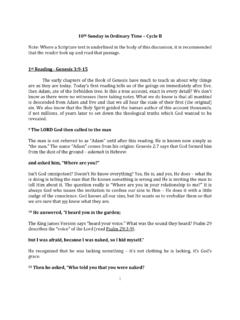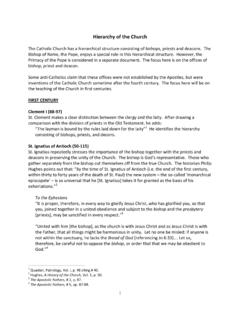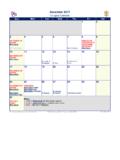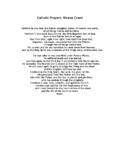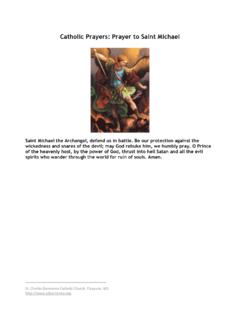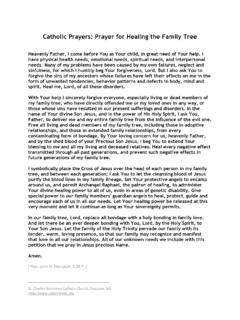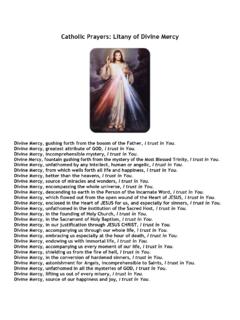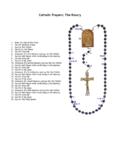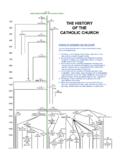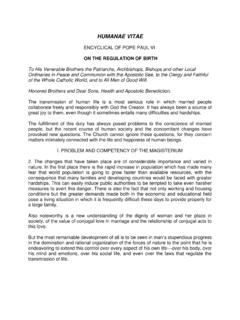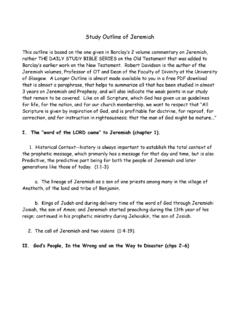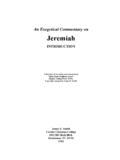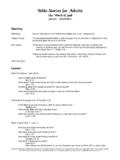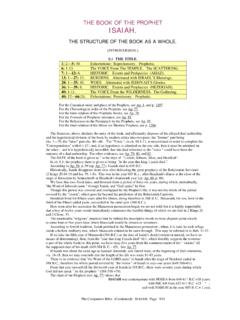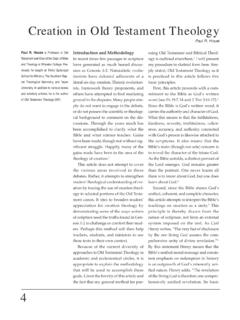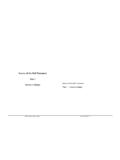Transcription of 16th Sunday in Ordinary Time - Cycle B
1 1 16th Sunday in Ordinary time Cycle B Note: Where a Scripture text is underlined in the body of this discussion, it is recommended that the reader look up and read that passage. 1st Reading - jeremiah 23:1-6 jeremiah is classed as the second of the four major prophets (Isaiah, jeremiah , Ezekiel, & Daniel). They are called major because of the length of the works attributed to them. jeremiah is another of the reluctant prophets he frequently protests, in his conversations with God, his dislike of proclaiming the message of destruction.
2 He lived at the same time as Ezekiel (who we studied two weeks ago) and also at the same time as Zephaniah, Nahum, & Baruch (who was his secretary). jeremiah came from a priestly family and was called by God as an adolescent (628 ). His ministry lasted about 40 years. In order to make it clear that it is God s words he is reporting, he uses the phrase says the Lord 338 times in his writing. At the beginning of jeremiah s ministry we find that Palestine is divided into two kingdoms: Israel in the north and Judah in the south.
3 Part of Israel is a province of Assyria and the rest, along with Judah, is an Assyrian vassal state. The Assyrians had been the leading power in the near east for about 200 years and as a result of political influence Judah has experienced a resurgence of idolatry. The Assyrian empire, however, had crumbled and after about 625 there was no effective Assyrian government in Palestine. In 621 the Book of the Law was discovered in the Temple and Josiah (king 639-609 ) led a thorough reform in Judah which extended into the northern kingdom.
4 This was a move of independence and it must be assumed that a number of people had remained faithful to God s covenant and supported the king. During Josiah s reign a solemn ceremony was conducted and the Mosaic covenant was renewed. There followed total destruction of all the high places where idolatrous practices were performed which kept Jerusalem as a unique cultic center. Josiah died in 609 (some historians think he was assassinated while others believe he died in battle).
5 His son Johoahaz was proclaimed king by the people but 3 months later was taken prisoner and brought to Egypt. Jehoiakim was installed as king by Pharaoh Necco III. jeremiah upbraided him for his servility to the Egyptians, saying it would cause his downfall and ruin the country. jeremiah had not favored pacts against the Medes and had prophesied that the Babylonians would prevail and that Jerusalem would be destroyed. In 605 all Syria and Palestine came under the control of Babylon and their king, Nebuchadnezzar.
6 When Jehoiakim died in 597 (probably assassinated) he was succeeded by his son Jehoiachin who 3 months later surrendered to the Babylonians and was deported along with the queen mother, the entire court, many nobles and people of every class except the poorest (Ezekiel was among these exiles). Zedekiah was installed as the newest (and last) king of Judah by Nebuchadnezzar. Today s reading is an oracle about this last king. 2 jeremiah and Baruch had stayed behind during the deportation but later were taken by some of their countrymen to Egypt.
7 The temple of Solomon was destroyed by the Babylonians in 586 Jewish tradition has it that jeremiah was starved to death by his fellow exiles. 23:1 Woe to the shepherds who mislead and scatter the flock of my pasture, says the LORD. The reference here is to bad shepherds the kings. 2 Therefore, Whenever this word appears, look to see what it is there for. It draws a conclusion or summarizes a teaching just made. thus says the LORD, the God of Israel, against the shepherds who shepherd my people: You have scattered my sheep and driven them away.
8 You have not cared for them, but I will take care to punish your evil deeds. 3 I myself will gather the remnant of my flock from all the lands to which I have driven them and bring them back to their meadow; God Himself is taking control; the rulers have failed in their job. there they shall increase and multiply. 4 I will appoint shepherds for them who will shepherd them so that they need no longer fear and tremble; and none shall be missing, says the LORD. 5 Behold, the days are coming, says the LORD, The term the days are coming is simply a means of calling attention to a very solemn proclamation.
9 When I will raise up a righteous shoot to David; A classic term synonymous with the Messiah (see Isaiah 11:1) As king he shall reign and govern wisely, he shall do what is just and right in the land. 6 In his days Judah shall be saved, Israel shall dwell in security. Both Judah and Israel will share in the salvation of the messiah. This is the name they give him: The LORD our justice. This is a word play on Zedekiah s name. Zedekiah means my justice is God and here the Messiah is given the name God is our justice.
10 Isaiah had already given a similar name to this future king Emmanuel (God is with us) (Isaiah 7:14). Justice means both God s saving 3 present and action. Comment: The ideal kingship (one which will realize the blessings of the covenant) can be seen in 2 Samuel 7 and is repeated in Psalms 2, 45, 72, 89, & 110. Prophets in dark times when kings were unfaithful, recalled this and promised its realization in the future using terms similar to those of jeremiah here (Isaiah 9:5-6; 11:1-9; Micah 5:1-5; Amos 9:11; Hosea 3:5).
